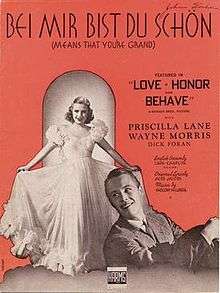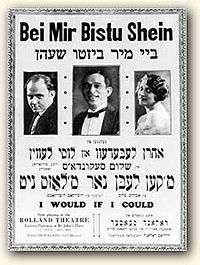Bei Mir Bistu Shein
| "Bei Mir Bist Du Shein" | |
|---|---|
 Sheet music cover | |
| Song | |
| Language | Yiddish |
| English title | "To Me You're Beautiful" |
| Written | 1932 |
| Composer(s) | Sholom Secunda |
| Lyricist(s) | Sammy Cahn, Saul Chaplin |
"Bei Mir Bistu Shein" (Yiddish: בײַ מיר ביסטו שיין, "To Me You're Beautiful") is a popular Yiddish song composed by Jacob Jacobs (lyricist) and Sholom Secunda (composer) for a 1932 Yiddish language comedy musical, I Would If I Could (in Yiddish, Men Ken Lebn Nor Men Lost Nisht, "You could live, but they don't let you"), which closed after one season (at the Parkway Theatre in Brooklyn, New York City). The score for the song transcribed the Yiddish title as "Bay mir bistu sheyn".[1] The original Yiddish version of the song (in C minor) is a dialogue between two lovers.
History

The song became known with English lyrics but retaining the Yiddish title, "Bei Mir Bistu Shein". It also appeared with a Germanized title "Bei mir bist du schön".
In 1937, Sammy Cahn heard a performance of the song, sung in Yiddish by African-American performers Johnnie and George at the Apollo Theater in Harlem, New York City. Grossinger's Catskill Resort Hotel proprietor Jenny Grossinger claimed to have taught the song to Johnnie and George while they were performing at the resort.[2] On seeing the response, Cahn got his employer to buy the rights so he (together with Saul Chaplin) could rewrite the song with an English lyric and rhythms more typical of swing music. Secunda sold the publishing rights to the song for a mere US$30 which later he split with Jacobs. Cahn then persuaded the still unknown Andrews Sisters to perform the song (recorded November 24, 1937). It became their first major hit, earning them a gold record, the first ever to a female vocal group. It was also a worldwide hit. Bei Mir Bist Du Schön was the theme song for the 1938 movie, Love, Honor and Behave.
Over time, the song grossed some $3 million, with Secunda and Jacobs missing significant royalties. In 1961, the copyright on the song expired, and the ownership reverted to Secunda and Jacobs, who signed a contract with Harms, Inc., securing proper royalties.[3]
Other versions
There have been several songs with the tune in the Soviet Union. In particular, in 1943, a Russian-language song for the music was produced with satirical anti-Nazi lyrics titled "Baron von der Pshik" ("Барон фон дер Пшик") by Anatoli Fidrovsky, music arrangement by Orest Kandat.[4] Initially it was recorded by the jazz orchestra (director Nikolay Minkh) of the Baltic Fleet Theatre;[5] later it was included into the repertoire of Leonid Utyosov's jazz orchestra.[4]
In Nazi Germany it was also a hit until its Jewish origins were discovered, at which point it was promptly banned.[6]
In the late Soviet period, a similar version came out under the name "In the Cape Town Port", with lyrics by Pavel Gandelman, a Jewish native of Leningrad. This song was performed by Russian singers Larisa Dolina and Arkady Severny.
Towards the end of the Taxi episode "The Costume Party", Latka, Alex and Tony (dressed as the Andrews Sisters) sing this tune.
The song is performed by Renata Flores in the 1980 film The Last Metro and by Janis Siegel in the 1993 film Swing Kids.[7]
Shasta Beverage Company adapted the song for a 1976 TV advertisement for its root beer ("it's root beer, Mr. Shane ...").[8]
Gemma Ray covered this song on her 2010 record It's A Shame About Gemma Ray.
In November 2011, the Azerbaijani pop singer Ilhama Gasimova released her single "Bei Mir Bist Du Sheen", featuring DJ OGB.[9]
For the one hundredth birthday of Sammy Cahn, a special arrangement of this song was made by Dean Groves for the American Classics album, It's Magic.[10]
Bette Midler covered the song for her 2014 album It's the Girls!.
The Andrews Sisters' recording can be heard in the television series X-Files episode "Triangle" (1998).
The song is included in the hit video game BioShock.
The song is performed in the play Indecent.
Rebecca Parham of Let Me Explain Studios sang this song in her one million subscribers special.[11]
Recorded versions
In addition to the original (or modified/translated) lyrics, a number of songs are known which borrowed only the popular tune of "Bei Mir...", with completely unrelated text.
|
A
B
C
D
E
F
G
H
I
J
K
|
L
M
N P
Q R
S
T
U
V W
Z
|
Notes
- ↑ Gottlieb, Jack (2004). Funny, It Doesn't Sound Jewish: How Yiddish Songs and Synagogue Melodies Influenced Tin Pan Alley, Broadway, and Hollywood. SUNY Press. p. 57. ISBN 978-0-8444-1130-9.
- ↑ Whitfield, S. J. (2001). In Search of American Jewish Culture. UPNE. pp. 1–2. ISBN 978-1-58465-171-0.
- ↑ Sholom Secunda - The Story of Bei Mir Bist Du Schoen, from the Milken Archive of Jewish American Music
- 1 2 3 Search results for "Kandat" at russian-records.com
- ↑ (Russian) Archived 2011-07-27 at the Wayback Machine.
- ↑ "Bay mir bistu sheyn". milkenarchive.org. Milken Archive of Jewish Music. Retrieved 2016-07-23.
- ↑ Carter, Thomas (1993-03-05), Swing Kids, retrieved 2016-07-23
- ↑ "Root Beer Saloon Ad - Shasta 1976" at YouTube
- 1 2 "Bei Mir Bistu Shein" with Ilhama Gasimova, featuring DJ OGB at YouTube
- ↑ "It's Magic - Centennial Tribute to Sammy Cahn". americanmusicpreservation.com. Retrieved 2016-07-23.
- ↑ Let Me Explain Studios (2018-04-02), Bei Mir Bist Du Schoen- Rebecca Parham (Music Video Only), retrieved 2018-04-03
- ↑ It's the Girls!
- ↑ Budapest Klezmer Version on YouTube
- ↑ https://itunes.apple.com/au/artist/don-burrows/id200778195
- ↑ Second Hand Songs - Medium: Eydie Steve Sing the Golden Hits - Eydie Gormé and Steve Lawrence
- ↑ "Gevolt - AlefBase - Bay Mir Bistu Sheyn". (Metal Version)
- ↑ Capitol Records in the 2000 - 2499 series
- ↑ V Keiptaunskom portu (Odessa motif), words by Pavel Gandelman on YouTube (in Russian)
- ↑ Dot Records
- ↑ Dot Album Discography, Part 1
- ↑ Second Hand Songs - Medium: Betcha Bottom Dollar - The Puppini Sisters (2006)
- ↑ Second Hand Songs - Medium: Ramsey Lewis and His Gentlemen of Swing - Ramsey Lewis and His Gentlemen of Swing
- ↑ Second Hand Songs - Medium: Introducing Robin McKelle - Robin McKelle (2006)
- ↑
- ↑ Eugene B. Bergmann, Excelsior, You Fathead!: The Art and Enigma of Jean Shepherd, 2005, ISBN 1-55783-600-0, p. 203
- ↑ Teresa Brewer
- ↑ Zarah Leander Archived 2011-04-08 at the Wayback Machine.
External links

- Page on the song at Yiddish Radio Project site
- Bei Mir Bist Du Schoen - Sholem Secunda, Jacob Jacobs, Sammy Cahn and Saul Chaplin (Lyrics and Chords)
- History of Bei Mir Bistu Shein featuring archival film clips on YouTube (in Russian)
- The Andrews Sisters sing Bei Mir Bistu Shein with new English lyrics (1937) on YouTube
- Lyricist's granddaughter tells "The Real Story of Bei Mir Bistu Shein" on YouTube
- Lyrics of this song at MetroLyrics